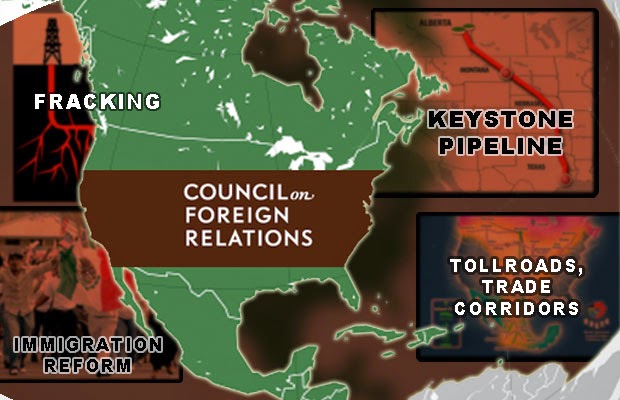 Aaron Dykes
Aaron Dykes
Activist Post
Former General David Petraeus and former World Bank head Robert Zoellick are leading the Council on Foreign Relation’s latest push for an ‘integrated’ North America.
Today, these men are leaders of predatory global finance: Petraeus now heads KKR Global, the leveraged buyout firm, while Zoellick is a senior advisor to Goldman Sachs International. Both men were also in attendance at the secretive 2014 Bilderberg conference.
Petraeus and Zoellick are the co-chairs of the CFR’s North America: Time for a New Focus, a globalism blueprint they claim carries an “integration and sovereignty” approach that somehow meaningfully differs from the EU’s ‘shared sovereignty’.
According to Robert Zoellick, North America can become can be a “new growth market” under integration, rife with exploitable opportunities through a ‘doubling down’ of NAFTA-style policies that they expect 2016 presidential candidates to pursue.
Zoellick explicitly stated, “I hope that this report will provide an agenda for both [U.S. political] parties in the presidential elections in 2016.”
Hillary Clinton, for one, has already admitted that her orders are issued at the Council on Foreign Relations, while Jeb Bush, also a prospective candidate in 2016 authored a CFR report on immigration reform and is brother to the president who founded the Security and Prosperity Partnership of North America, based on CFR blueprints for Building a North American Community.
Under the CFR’s vision, North America would focus on U.S. markets “in energy, robotics, biotech, software, and big data” and combine with Canada’s developed economy and natural resources and ‘reforms’ in Mexico that have helped ‘harmonize’ it with the U.S. banker-led vision for the continent.
The CFR report claims that: “The development and implementation of a strategy for U.S. economic, energy, security, environmental, and societal cooperation with its two neighbors can strengthen the United States at home and enhance its influence abroad.”
 There is a particular focus on energy, with emphasis on boosted production expected from the Keystone pipeline, hugely expanded shale gas fracking operations and new markets for liquid natural gas. Another CFR report this month is The Shale Gas and Tight Oil Boom: U.S. States’ Economic Gains and Vulnerabilities, focusing on a predicted shift away from foreign oil dependence – as the dollar fades and its petrodollar privilege declines with it.
There is a particular focus on energy, with emphasis on boosted production expected from the Keystone pipeline, hugely expanded shale gas fracking operations and new markets for liquid natural gas. Another CFR report this month is The Shale Gas and Tight Oil Boom: U.S. States’ Economic Gains and Vulnerabilities, focusing on a predicted shift away from foreign oil dependence – as the dollar fades and its petrodollar privilege declines with it.
Under a “smart regional energy policy,” Mexico – and its natural gas supplies – would be chained into a North American power grid alongside the United States, while Americans-at large would be committed to carbon reductions and environmental austerity policies.
Robert Zoellick told the CFR’s Jonathan Masters in an interview:
“The report recommends expanding the [U.S.] electricity grid with Mexico, which could provide lower cost electricity because of lower cost natural gas. This support would show the Mexican public the benefits of reform.”
[…]
The United States can also do more to capture the full benefits of energy innovation. For example, the report recommends removing legal restrictions on exports of oil and liquid natural gas, which is important if the U.S. expects to draw continued energy investment, because investors need to receive a competitive world price for their products. The report identifies problems with infrastructure, such as the electricity grid or pipelines. In the case of pipelines, we note that Central America, a nearby region of fragility, has very high energy prices, and the eventual extension of natural gas pipelines and supplies to the region could support Central American democracy and growth.
The report notes that many of the gains of energy so far have been at the exploration and production stages. To truly capture the second stage—dependent on the use of lower priced energy—the three countries need to create the regulatory conditions for greater capital investment. When companies have to make a big capital investment, they need regulatory clarity with regard to topics such as safety, conservation, methane capture, and plans to deal with carbon. All three countries can be more competitive with better and more integrated energy policies. Also, we recommend, in particular, that the XL Pipeline should be approved.
The report also continues the trend of pushing for immigration reform, opening erasing borders to a globalized labor force, migrant workers, foreign consumer goods, service and finance and, of course, “harmonized policies” wherever possible.
Significantly, Petraeus – once a four-star general and head of the CIA – and Zoellick also recommend an office at the National Security Council for North America – making national security a matter of continental and global security. This creates a fundamental and important runaround of constitutional protections for the United States of America, its people and their sovereignty.
This report represents a major update in the pursuit of a North American Union introduced publicly circa 2005 with the CFR’s Building a North American Community and the signing of quiet trilateral agreements for the Security and Prosperity Partnership of North America by President George W. Bush and his counterparts Stephen Harper and Vicente Fox in Canada and Mexico in 2006.
Media figures like Jerome Corsi and Lou Dobbs led the charge in exposing the global-corporate merger and criticizing the blackout in coverage of the events, with most of the corporate media eerily silent about these tectonic events on the North American continent.
Moreover, this North American merger joins the larger chorus of instituting global governance that has already sung loudly in the EU, and more softly in the African Union and various formative stages of unions Pacific, Latin/Pan-America and other global unions.
As Bilderberg investigative reporters Jim Tucker and Daniel Estulin have noted, the European Union was the result of a 50-year project launched as a major component of the Bilderberg meetings themselves, founded in 1954.
The insider connections of the European and American banking, political and industrial powers fostered a series of benchmarks to bind the continent together through progressive agreements to integrate first through the European Coal and Steel Community, the European Common Market and then various subsequent treaties before the European Union became a formal – and binding – institution.
 Interestingly, Putin just signed a Russo-centric Eurasian Economic Union agreement for his corner of the world – complementing the Russian-led creation of the BRICS development bank, widely seen as a landmark move in shattering the petrodollar paradigm, yet clearly still another BRIC in the wall of the new world order global governance project.
Interestingly, Putin just signed a Russo-centric Eurasian Economic Union agreement for his corner of the world – complementing the Russian-led creation of the BRICS development bank, widely seen as a landmark move in shattering the petrodollar paradigm, yet clearly still another BRIC in the wall of the new world order global governance project.
The U.S. has also been pushing two important, but lesser known agreements to bind the world under Anglo-centric trading terms.
The secretive Trans-Pacific Partnership – to encompass the Asia-Pacific sphere (save China) – has been under negotiation for the last couple of years, though little of it has seen the light of public disclosure, while the Transatlantic Trade and Investment Partnership (TTIP) would economically encircle the the European sector to create a corporate friendly atmosphere for Anglo-centric trade.
Some have blasted it as a trade off of national sovereignty for corporate sovereignty, a just and succinct analysis of the world.
It should be noted that another vision of the Eurasian economic future is also on the horizon. Washington is attempting to impose a Transatlantic Trade and Investment Partnership (TTIP) on Europe and a similar Trans-Pacific Partnership (TPP) on Asia.
Both favor globalizing American corporations and their aim is visibly to impede the ascent of the BRICS economies and the rise of other emerging markets, while solidifying American global economic hegemony.
Gen. Petraeus, Zoellick and company are calling for Canada and Mexico to be included in the TTIP – as they already are with the Trans-Pacific Partnership – in the name of greater North American integration, and for U.S. leaders to focus on globalizing their home turf in the coming period after Obama.
Download and read the report from the Council on Foreign Relation’s website [PDF].
Aaron Dykes is a co-founder of TruthstreamMedia.com, where this first appeared. As a writer, researcher and video producer who has worked on numerous documentaries and investigative reports, he uses history as a guide to decode current events, uncover obscure agendas and contrast them with the dignity afforded individuals as recognized in documents like the Bill of Rights.


I believe George Bush signed us into the North American Union in 2005 but the real transition has been so slow as to not frighten the people.
If you turn up the heat on the pot slow enough you can cook the frogs and they won’t even notice.
Then the smaller unions, African, European, Eurasian, North American can then all be brought under one control.
Unfortunately this means the subjugation of the people of the world.
You don’t mind do you?